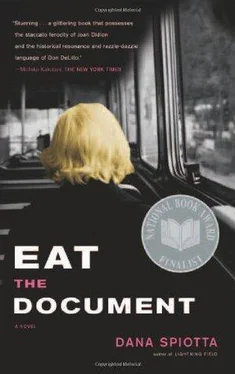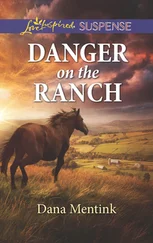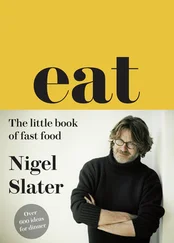Dana Spiotta - Eat the Document
Здесь есть возможность читать онлайн «Dana Spiotta - Eat the Document» весь текст электронной книги совершенно бесплатно (целиком полную версию без сокращений). В некоторых случаях можно слушать аудио, скачать через торрент в формате fb2 и присутствует краткое содержание. Год выпуска: 2006, Издательство: Scribner, Жанр: Современная проза, на английском языке. Описание произведения, (предисловие) а так же отзывы посетителей доступны на портале библиотеки ЛибКат.
- Название:Eat the Document
- Автор:
- Издательство:Scribner
- Жанр:
- Год:2006
- ISBN:нет данных
- Рейтинг книги:3 / 5. Голосов: 1
-
Избранное:Добавить в избранное
- Отзывы:
-
Ваша оценка:
- 60
- 1
- 2
- 3
- 4
- 5
Eat the Document: краткое содержание, описание и аннотация
Предлагаем к чтению аннотацию, описание, краткое содержание или предисловие (зависит от того, что написал сам автор книги «Eat the Document»). Если вы не нашли необходимую информацию о книге — напишите в комментариях, мы постараемся отыскать её.
shifts between the underground movement of the 1970s and the echoes and consequences of that movement in the 1990s. A National Book Award finalist,
is a riveting portrait of two eras and one of the most provocative and compelling novels of recent years.
Eat the Document — читать онлайн бесплатно полную книгу (весь текст) целиком
Ниже представлен текст книги, разбитый по страницам. Система сохранения места последней прочитанной страницы, позволяет с удобством читать онлайн бесплатно книгу «Eat the Document», без необходимости каждый раз заново искать на чём Вы остановились. Поставьте закладку, и сможете в любой момент перейти на страницу, на которой закончили чтение.
Интервал:
Закладка:
Every morning she got up at five. She went to the diner and got ready for the breakfast rush. It was over by eight thirty, and then they would have a long cigarette break and get ready for the lunch rush at eleven thirty. They were busy, which made the time pass quickly. At two she would be exhausted and nearly done with her work. Ready for another cigarette, a change of clothes, and then a beer or a Seven & Seven. The girls all drank Seven & Seven or Canadian Club and Coke.
The next day they would show up, laughing about hangovers and throat clearing behind their fists over cigarettes and coffee. They stacked scratched yellow molded-plastic glasses for water. They refilled ketchup bottles and saltshakers. The quarters and dimes added up to a surprising amount of money. She liked the midmorning coffee break: one lit cigarette after another, and endless cups of weak coffee from thick mugs with permanent stains in the bottoms. It took three packets of sugar and two containers of half-and-half for the coffee to taste of anything. They wiped old, sticky syrup from plastic dispensers with wet cotton rags. They swept the floor and sprayed Windex on the Formica counter (Formica is a decorative laminate made of paper and melamine resin — she couldn’t help but hear Bobby’s voice. But it pleased her that she remembered), then there was yet another cigarette break, and a round of cleaning plastic menus until they signed out at three. Sometimes in the heat of the rush they would move within inches of each other — reach and duck at the exact right moment without saying a word. She felt an adrenaline lift getting it done when five things needed to be done all at once. Being able to do this in the face of chaos gave her a tangible confidence she hadn’t felt before. It was satisfying — a confidence that she wore in her hips.
She wasn’t exactly like these women, it was true, but she was close enough.
These were not “liberated” women. They wore orange-toned Pan-Cake makeup and push-up bras. They all watched their figures (and used that word, figure ) and never wore anything but inexpensive, synthetic clothes. They didn’t discuss the issue of vaginal versus clitoral orgasms or debate the inherent oppression of intercourse. But they spoke often of sex and men — all of them were divorced or supporting someone who cheated on them. They wore awful orange-tan stockings and took care of their kids by themselves. They smoked and drank and didn’t mind their lives until they had one too many Seven & Sevens. Then they burst into tears at the prospect of forty more years of the same jobs and the same men, but with less pretty faces and more painful backs.
They weren’t all that different from the consciousness-raising women or from her.
She liked it, and within days she felt she could pass for one of them. She was getting good at this, she really was. It was funny — she thought of it like that, but she was one of them. After all, who were they, exactly?
Anyone can start a new life, even in a small town. Everyone moves so much these days. You get a divorce, you move and start over. Try it. See how little people ask about you. See how little people listen. Or, more precisely, think about how little you really know about the people you know. Where they were born, for instance. Have you met their parents? Or siblings? There was a time, maybe, when just being new in a town made you seem suspect. Because you were suspect — people didn’t have any way to verify you were who you said you were. And why did you have to leave where you came from? But there is a long history (seldom spoken of in the gloriously amnesiac everyday) in America, and in a democracy, of starting over. It was almost an imperative, wasn’t it? America was founded, of course, by people who invented new lives, who wanted nothing more than to jettison the weight of all that history, all that burden and all that memory of Europe. That was one form of freedom. Freedom from memory and history and accounting. Even if an endless series of beginnings tended to reduce everything to shallow repetition and eliminate any possibility of profound experience, it certainly served her, at this moment, in this place.
New Year’s Eve, 1973. She sat at the bar and waited for her friend Betsy to return from the bathroom. They had already drunk many cocktails and were probably going to go to a party with Betsy’s boyfriend and his buddy. Or they would stay at the bar all night and listen to the bartender, Jack, in his early thirties and with the indifferent, slightly crawly sexiness of Bruce Dern, but with more muscles and less darkness. He doted on them but only ever spoke in a deadpan that the women found increasingly hysterical. He would do just as well as a party, and they would not have to worry about fresh drinks or melted ice at midnight.
It was true that she could have driven to L.A. She could have covered a few shifts at work, borrowed Betsy’s car and been in Venice in five hours. It was also true that, despite her drinks and Jack’s dry humor, she did think about whether Bobby had turned up at the designated place and was waiting for her right now. But she was pretty sure he wouldn’t have shown. She could not bear going there, all that way, to be let down by him. She would rather sit here and still have the possibility that he might have shown rather than the certainty of disappointment. It was 1974, and she celebrated with her new friends and began the unthinking of it. She tried not to think about the dream she’d had the night before. She didn’t believe in premonitions, of course, but she had started to feel uneasy. All the paranoia came back. Her ID here was not at all secure — she had been way too careless about that, again. And there, at the edges of the forced festivities of this night, among her new friends, she knew she would be leaving this place also — definitely and soon.
She told people she had to go back East and take care of her ailing mother. She had five hundred dollars saved, and by spring she finally reached the West Coast. She would get an airtight ID, and she would be safer in a big city. She moved randomly from place to place on the outskirts of L.A. These were the days of pale-beneath-the-tan partying, roller skates and halter tops. And harder, meaner drugs. It was as if someone had taken the aura of the counterculture and extracted every decent aspiration. What was left was the easy liberation of sex and drugs. Was this a function of Southern California, or was every place as weary as this now? Surely the sunshine and beach made the boardwalk a magnet for every marginal person in America. Southern California was full of off-the-grid illegals: draft dodgers, ex-cons, undocumented workers. It was exactly what she wanted. Here she could disappear into the everyday. She could stay far from the rads.
She drank beer and smoked pot all the time. She walked on the beach and had short relationships with men who lived off her.
Only one thing gave her purpose: she needed a new identity, not one made up but one that could be built on. It was a project. She scoured microfilm in the local libraries until she found a baby’s obituary. She needed a person with a birth certificate who had never applied for a Social Security number. She needed a baby who had died in a different county from where she was born, so no cross-reference was made with the death certificate. (Bobby described this method as straight out of Day of the Jackal, and why not?) She could easily obtain a copy of the birth certificate, and from there she could get fake “unfake” and untraceable ID. She could get a real Social Security number, a real driver’s license and even a real passport. She methodically built her documents. That was her main achievement of those L.A. years: a safe, airtight identity. She became the dead infant Louise Barrot.
Читать дальшеИнтервал:
Закладка:
Похожие книги на «Eat the Document»
Представляем Вашему вниманию похожие книги на «Eat the Document» списком для выбора. Мы отобрали схожую по названию и смыслу литературу в надежде предоставить читателям больше вариантов отыскать новые, интересные, ещё непрочитанные произведения.
Обсуждение, отзывы о книге «Eat the Document» и просто собственные мнения читателей. Оставьте ваши комментарии, напишите, что Вы думаете о произведении, его смысле или главных героях. Укажите что конкретно понравилось, а что нет, и почему Вы так считаете.












